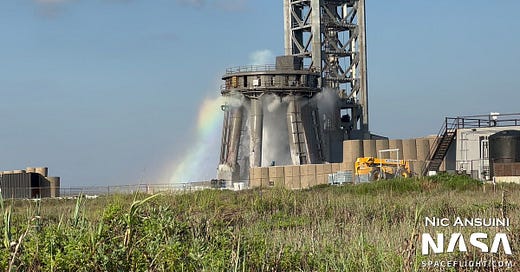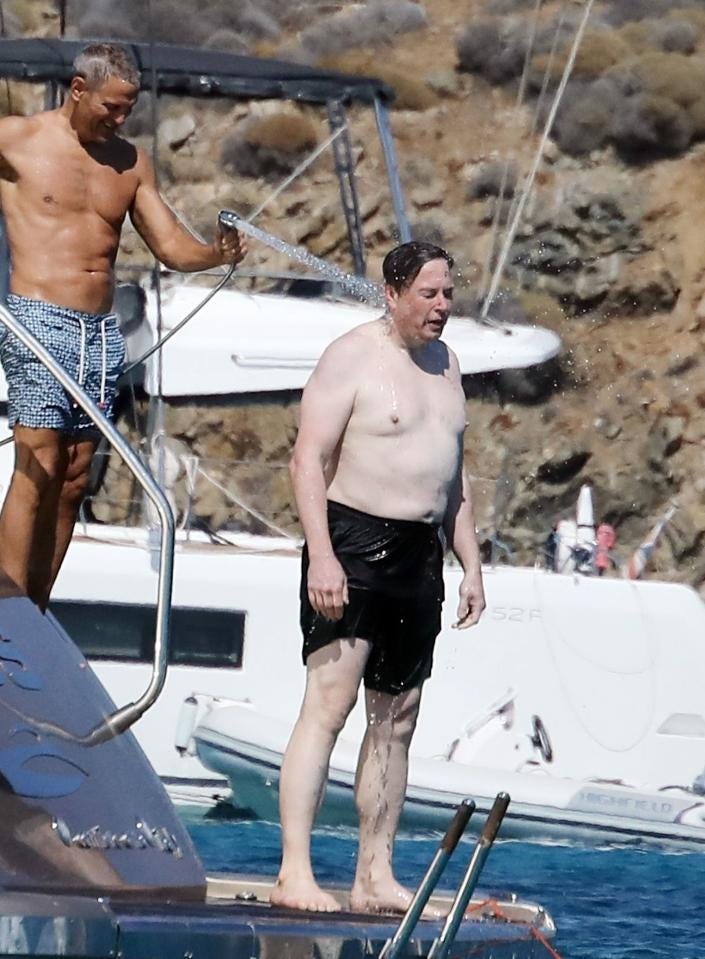Boom! You thought I disappeared on ya. Sorry to disappoint y’all. I spent far too much of the past 18 months documenting SpaceX’s shitshow on the gulf, the Boca Chica launch facility. Long-time readers know that a majority of my work centered on the public portion of the FAA-sponsored NEPA permitting process, which was initiated in September of 2021 and wrapped up in Summer of this year.
SpaceX lied repeatedly in the process and made countless reckless and nonsensical claims to try to fast-track orbital tests of the Super Heavy/Starship project. The most egregious portions involved the Elon Musk company trying to greenwash away construction of a oil and gas drilling, pipeline and processing operation, complete with an LNG plant and 250 Megawatt natural gas power plant. These more ambitious portions of the project were axed, but the Agency approved SpaceX’s sloppy and reckless plans to explode rockets in the middle of a Federally protected wildlife sanctuary regardless.
Part of the approval requires SpaceX and the FAA to disclose ongoing progress with promised mitigation and permitting steps. The agency doesn’t have a dashboard displaying progress, which is itself likely a NEPA violation since they promised to do so, but my expectation for above-board behavior from them is all but gone.
I haven’t been writing much for some personal reasons as well as a severe case of writer’s block. But I haven’t exactly been inactive, instead keeping a close eye on state and federal permitting actions in regard to the site and it’s been, well… quiet.

Luckily, local activists have been much more proactive than I; an email from The Texas Commission on Environmental Quality (TCEQ) came into my possession this week that confirms my suspicions. SpaceX doesn’t appear to be interested in doing basic tasks to assure compliance with environmental rules. Quelle Surprise!
This email comes from the Director of Water Quality at the agency. TCEQ is responsible for enforcing State rules in addition to being the delegated authority for permitting and enforcement of the Federal Clean Water Act.
The Clean Water Act is a sprawling beast but today we’ll be focusing on the National Pollution Discharge Elimination System (NPDES) program. Briefly, this program involves permitting of pollution to surface waters. This is to ensure that discharges from industrial sources, from wastewater treatment plants, to agricultural and factory runoff doesn’t cause rivers, lakes and wetlands to become polluted to a level that would ruin the natural characteristics of the water body. Too much biomass and nitrogen would cause algae plumes and choke off dissolved oxygen, killing fish. Too many heavy metals will make the water unsafe for human recreational usage. You get the idea.
There are 3 programs under NPDES that we need to discuss here:
Permits for industrial wastes
Operating permits for Stormwater
Construction permits for Stormwater
Industrial wastewater is any water that is used or comes into contact with an industrial process. The most obvious example is water discharged from a wastewater treatment plant, but there are countless examples of process wastewater associated with every heavy industry under the sun.
Stormwater is incidental pollution carried by rain events. If you operate large process or storage vessels outside, for example, rain will contact the surface of these and wash off chemical residuals, leading to pollution. Construction stormwater permits are temporary permits required when doing site construction, as things like concrete and agitated soil will create particulate and chemical effluents as they run off the construction site.
Now, onto SpaceX. FAA’s approval of Starbase was a “mitigated” FONSI, which means the approval is conditional upon several conditions, as outlined here.
One condition requires the site to apply for a General stormwater permit. We can see that SpaceX’s SIC code (for Space Vehicle manufacture) is covered under the general permit.
Per the FAA:
In conjunction with final design and CWA permitting, SpaceX would submit a Notice of Intent to TCEQ for application of the general permit authorization for point source discharges of stormwater associated with industrial activity to surface water in the state. SpaceX would develop a SWPPP that would adhere to the permit effluent limitations and requirements applicable to the industrial activities.
Now, SpaceX has been manufacturing spacecraft for some time. Years, in fact. They should have had a Stormwater permit in place long ago. But they didn’t. And six months after the above condition was placed upon them, there still isn’t one. Don’t take my word for it. TCEQ confirms that there are only “one domestic wastewater reuse authorization (No. 2E-0000298) and two construction stormwater general permits (No. TXR1595KG and TXR15962P) associated with the Starbase Production Site.”
Regarding industrial wastes and water treatment, here are the conditions given to SpaceX by the FAA:
If water treatment or retention is required, SpaceX would contain water in retention ponds.
Retention ponds would be lined to prevent percolation of contaminants into the groundwater and would be maintained and monitored by SpaceX.
SpaceX would develop appropriate sampling protocols and water quality criteria in coordination with the TCEQ in accordance with Texas Surface Water Quality.
SpaceX would manage any deluge water according to state and local water quality requirements (e.g., pretreatment permits, NPDES permits, etc.).
TCEQ confirms that “deluge wastewater from rocket launches would be a type of industrial wastewater. As of December 5, 2022, TCEQ has not received an industrial wastewater application for this site. In the absence of an application TCEQ cannot provide insight into potential treatment and disposal of the deluge wastewater.”
That’s, um, interesting, because, well…
This water is not in a closed system, it is not rainwater, and it is not firefighting water. This deluge system, whether a rocket engine is being fired or not, is a source of industrial wastewater. It requires a permit that they do not have. SpaceX apparently thinks they can just skip complying with the law. Which, I suppose time has shown is the case, in practice.
Do I think anything will come of this? No, I do not. Should FAA or TCEQ do something about it? Probably!
It’s just another example of an Elon Musk enterprise being just the worst in every possible way. From calling health authorities “fascists” for trying to enforce pandemic shutdown orders, to telling the SEC to suck his cock, to baselessly accusing former Twitter employees of being pedophiles, every company touched by Musk is an absolutely toxic regulatory hellhole.
Maybe 2023 will be better. Expect more from me soon.
XOXO
FULL EMAIL FROM TCEQ:
The Texas Commission on Environmental Quality (TCEQ) is in receipt of your correspondence to the Commissioners and Executive Director, dated December 1, 2022, regarding the Starbase Production Site (Regulated Entity Number RN107697088) which is owned by Space Exploration Technologies Corp. (Customer Number CN602867657). We appreciate your interest in protecting the environment, and hope that you find the following information helpful.
The Starbase Production Site is a proposed vertical launch area located at the eastern terminus of Boca Chica Boulevard, State Highway 4, in Brownsville, Texas. TCEQ has authorized one domestic wastewater reuse authorization (No. 2E-0000298) and two construction stormwater general permits (No. TXR1595KG and TXR15962P) associated with the Starbase Production Site. No air permits have been requested or authorized for the rocket because it’s a mobile source that doesn’t require an air permit.
In response to your first and second questions regarding deluge wastewater and potential receiving water impacts, deluge wastewater from rocket launches would be a type of industrial wastewater. As of December 5, 2022, TCEQ has not received an industrial wastewater application for this site. In the absence of an application TCEQ cannot provide insight into potential treatment and disposal of the deluge wastewater.
In response to your third question regarding domestic wastewater, an on-site investigation conducted by TCEQ on September 16, 2021 documented that domestic wastewater was being collected in covered tanks, then pumped and hauled to the City of Harlingen Wastewater Treatment Plant No. 2 for disposal. The domestic wastewater reuse authorization (No. 2E-0000298) was issued on December 28, 2021. The reuse authorization allows treatment and reuse of up to 15,000 gallons per day of domestic wastewater and stormwater generated by WaterFleet LLC (RN111352415) at the Stargate Production Site. The reuse water may be used for on-site dust suppression, fire protection, irrigation, toilet and urinal flushing, and industrial processes. Discharge of reuse water into water in the state, including the nearby wetland, is not permitted by this authorization. Reuse authorizations, also known as “reclaimed water”, are regulated by Title 30 Texas Administrative Code (TAC) Chapter 210. The Requirements for Reclaimed Water webpage provides more information on these types of authorizations.
The TCEQ Central Registry is an online application that allows the public to search for basic information on many of the facilities, organizations, and customers our agency regulates. You may search by Regulated Entity Number, Customer Number, or Program ID (e.g. authorization or permit number). As applications are submitted to TCEQ, the Central Registry is updated frequently to provide the public with the latest air, water, and waste application information.
If you have any additional questions, please contact me at (REDACTED)
Sincerely,
Cari-Michel La Caille
Cari-Michel La Caille, Director
Office of Water
Texas Commission on Environmental Quality










Has on official complaint been made to TCEQ regarding the unauthorized industrial wastewater discharge? The State might not officially look into the matter unless they are forced to.
Excellent writing - keep up the good work, and thank you!